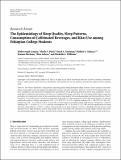| dc.contributor.author | Lemma, Seblewengel | |
| dc.contributor.author | Patel, Sheila V. | |
| dc.contributor.author | Tarekegn, Yared A. | |
| dc.contributor.author | Tadesse, Mahlet Getachew | |
| dc.contributor.author | Berhane, Yemane | |
| dc.contributor.author | Gelaye, Bizu | |
| dc.contributor.author | Williams, Michelle A | |
| dc.date.accessioned | 2013-12-13T17:43:40Z | |
| dc.date.issued | 2012 | |
| dc.identifier.citation | Lemma, Seblewengel, Sheila V. Patel, Yared A. Tarekegn, Mahlet G. Tadesse, Yemane Berhane, Bizu Gelaye, and Michelle A. Williams. 2012. The epidemiology of sleep quality, sleep patterns, consumption of caffeinated beverages, and khat use among ethiopian college students. Sleep Disorders 2012:583510. | en_US |
| dc.identifier.issn | 2090-3545 | en_US |
| dc.identifier.uri | http://nrs.harvard.edu/urn-3:HUL.InstRepos:11375878 | |
| dc.description.abstract | Objective:. To evaluate sleep habits, sleep patterns, and sleep quality among Ethiopian college students; and to examine associations of poor sleep quality with consumption of caffeinated beverages and other stimulants. Methods:. A total of 2,230 undergraduate students completed a self-administered comprehensive questionnaire which gathered information about sleep complaints, sociodemographic and lifestyle characteristics,and theuse of caffeinated beverages and khat. We used multivariable logistic regression procedures to estimate odds ratios for the associations of poor sleep quality with sociodemographic and behavioral factors. Results:. Overall 52.7% of students were classified as having poor sleep quality (51.8% among males and 56.9% among females). In adjusted multivariate analyses, caffeine consumption (OR = 1.55; 95% CI: 1.25–1.92), cigarette smoking (OR = 1.68; 95% CI: 1.06–2.63), and khat use (OR = 1.72, 95% CI: 1.09–2.71) were all associated with increased odds of long-sleep latency (>30 minutes). Cigarette smoking (OR = 1.74; 95% CI: 1.11–2.73) and khat consumption (OR = 1.91; 95% CI: 1.22–3.00) were also significantly associated with poor sleep efficiency (<85%), as well as with increased use of sleep medicine. Conclusion:. Findings from the present study demonstrate the high prevalence of poor sleep quality and its association with stimulant use among college students. Preventive and educational programs for students should include modules that emphasize the importance of sleep and associated risk factors. | en_US |
| dc.language.iso | en_US | en_US |
| dc.publisher | Hindawi Publishing Corporation | en_US |
| dc.relation.isversionof | doi:10.1155/2012/583510 | en_US |
| dc.relation.hasversion | http://www.ncbi.nlm.nih.gov/pmc/articles/PMC3581089/pdf/ | en_US |
| dash.license | LAA | |
| dc.title | The Epidemiology of Sleep Quality, Sleep Patterns, Consumption of Caffeinated Beverages, and Khat Use among Ethiopian College Students | en_US |
| dc.type | Journal Article | en_US |
| dc.description.version | Version of Record | en_US |
| dc.relation.journal | Sleep Disorders | en_US |
| dash.depositing.author | Tadesse, Mahlet Getachew | |
| dc.date.available | 2013-12-13T17:43:40Z | |
| dc.identifier.doi | 10.1155/2012/583510 | * |
| dash.contributor.affiliated | Gelaye, Bizu | |
| dash.contributor.affiliated | Tadesse, Mahlet Getachew | |
| dash.contributor.affiliated | Williams, Michelle | |
| dc.identifier.orcid | 0000-0001-5807-5281 | |


